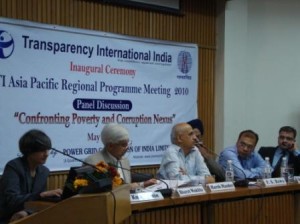
Speakers at the event
To set the stage for Transparency International’s (TI) Asia Pacific regional conference in Delhi, TI India held an event on poverty and corruption with regional experts from government, business and civil society. Participants met under the banner “Confronting the poverty and corruption nexus,” to discuss how approaches such as ethical leadership, joint responsibility and citizen empowerment are key to achieving positive change. Here are some highlights that I would like to share with you:
In his welcome address, the Chair of TI India, P.S. Bawa, set the tone for discussions, noting how many countries, including India, channel increasing resources into poverty reduction, yet meaningful results often remain to be seen.
The cruel reality that corruption punishes the poor the most was echoed throughout the evening. Drawing on TI research around the world, Pascal Fabie, TI Asia Pacific Regional Director, underscored the transnational nature of the problem: “From the favelas in Brazil to the bidonvilles in Burkina Faso, corruption extorts a tax that the poor can ill afford.” Noting that the marginalised and disadvantaged are on the receiving end of poverty and corruption, Fabie called for initiatives to shift from working for the poor and to begin working with them to end this plague.
Compelling evidence was provided by Iftekhar Zaman, Executive Director, TI Bangladesh, who stated that by empowering and mobilising citizens to know their rights and hold authorities to account tangible improvements can be made, from accessing public healthcare to receiving education.
Quoting India’s national motto “truth shall prevail”, Bharat Wakhlu, Resident Director, Tata Group, emphasised how acting with integrity is a shared responsibility for us all, as well as demanding that ethics is instilled in leadership.
Appointed by India’s Supreme Court as Food Commissioner to oversee the government’s efforts to provide food for all, social activist Harsh Mandar shared a sobering account of his first hand experiences of the destructive effects of corruption. He concluded that for people living on less than US $2 a day, petty bribery can make the difference between life with dignity and death.
For its part, TI works hard to tackle the poverty and corruption equation. One impressive example is TI India’s ongoing grassroots initiative for 8,000 poor rural families, which helps them access public services and state welfare schemes. Visiting communities in four regions across India, politicians, government officials and civil society groups, the chapter has worked hard to raise awareness of local governance processes, the right to information, the citizen’s charter and social audits. As a result, thousands of families are now accessing their basic entitlements. I will be speaking to Anupama Jha, Executive Director of TI India, and Iftekhar to hear more about how they are tackling the problem in their countries.















 Connect with us on Facebook
Connect with us on Facebook Follow us on Twitter
Follow us on Twitter